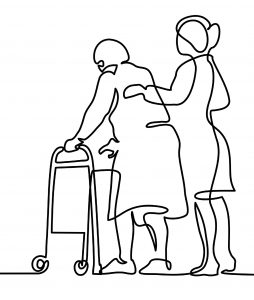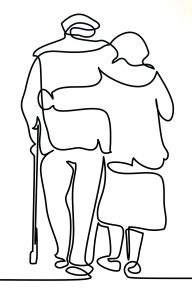By Cathy Fooks
Inspired by the yearly “State of Caring” report developed by Carers UK, The Change Foundation has launched an annual “Spotlight on Ontario’s Caregivers” survey, which we hope will build on our 2016 report, “A Profile of Family Caregivers in Ontario.”
In Canada, family caregivers provide around three-quarters of all patient care. A 2009 estimate put their contribution to the health care system at $25 billion per year. However, if we consider that caregivers provide an average of 11–30 hours of care per week, and using the current minimum wage of $14 per hour in Ontario, we can estimate that the contributions of family caregivers now add up to between $26 and $72 billion a year. And yet there a lack of up-to-date information on the diversity of family caregivers, the breadth and depth of their contributions, and their views of their own caregiving experiences. Through the “Spotlight on Ontario’s Caregivers” survey, The Change Foundation has now set out to better understand the experiences, profiles, and needs of family caregivers in Ontario.
Who is a family caregiver?
The Change Foundation defines family caregivers as family members, friends or neighbours who provide care for someone, without pay, because of frailty, a need for palliative care, long-term illness, long-term recovery from an accident or surgery, degenerative disease, physical or mental disability or an age-related disorder. In keeping with our commitment to co-design, we included caregivers in the survey’s planning, selection and review teams from the outset. Our researchers have also worked closely with the Patient Advisors Network to select our polling and communications vendors, and to develop the survey tool that would give us insight into various aspects of caregiving. A total of 800 Ontario caregivers were surveyed, with the following questions in mind.
- Who are caregivers caring for?
- What tasks are they responsible for?
- Where do caregivers turn for information and support?
- How does the role of caregiver impact the lives of both the caregiver and the care receiver?
- How do caregivers feel about their role as part of the health care team?
- What additional supports or information could help caregivers in their role?

Some findings…
Our findings from this survey echo what we have heard through our other work, including our Changing CARE projects, other research and policy work, and collaborations with additional stakeholders. Specifically, many caregivers do not self-identify as caregivers, often seeing their caring role as that of a spouse, child, parent or in-law. But, once the role has been explained, they ultimately do understand the role they play in their family member’s health care. In addition:
- Most caregivers feel they do not have a choice in taking on the role.
- Many provide a wide range of care and support activities, including emotional support, help with household chores or tasks, and administering medicine.
- Most caregivers feel that their family member would not receive the same quality of care and would be in a worse physical or mental condition if they were not caring for them.
- Caregivers generally appreciate the time they are spending with the person they are caring for, believe they are improving the life of their family member and feel rewarded for what they do by their family members. However, they point out that few to no formal supports are provided, and those that are provided are not easy for caregivers to find.
- Caregiving has a financial impact on caregivers, including out-of-pocket expenses, taking time off work and turning down career opportunities.
When initially asked, caregivers often say they feel positive and optimistic about their role. However, when they are asked more specific questions about their caregiving responsibilities, it is clear there are many aspects of caregiving that cause stress and leave caregivers feeling overwhelmed, helpless and frustrated. Many caregivers talk about experiencing both positive and negative impacts of their role.

The advantage of data
Today, there seems to be growing momentum to explore the role of and provide better support to family caregivers at both the provincial and federal levels. We believe that Ontario-specific data is imperative to better understanding the specific situation in our province, and to ensuring that The Change Foundation provides supports and services that truly address the needs of caregivers. Our plan is to continue our work in this area and to take the pulse of the caregiver experience annually for the next few years. This year’s report will act as a baseline for comparison and give us a sense of whether the momentum in Ontario for improving the caregiver experience is taking us in the right direction.
In addition to the survey, which provides us with data on the caregiver experience in a quantitative form, we have also set up an online panel of caregivers who we will turn to on an ongoing basis to help bring the qualitative side of the caregiver experience to life. This group will also provide further feedback on the issues and themes highlighted by the survey.
Although the survey will be conducted annually, with an accompanying report also published each year, The Change Foundation’s website will be updated regularly with caregiver stories and different takes on the survey data. We have even created a section on the website where you can manipulate the data yourself. This work—taken as a whole—underscores that supporting caregivers should remain an urgent priority, and will help to make this vision a reality.
Cathy Fooks is the president and CEO of The Change Foundation.















